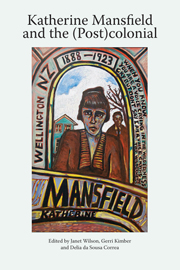Book contents
- Frontmatter
- Contents
- List of Illustrations
- Acknowledgements
- Colophon
- Introduction
- Criticism
- Katherine Mansfield: Cannibal
- Mansfield as (Post) colonial-Modernist: Rewriting the Contract with Death
- Colonialism and the Need for Impurity: Katherine Mansfield, ‘The Garden Party’ and Postcolonial Feeling
- ‘How Katherine Mansfield was Kidnapped’: A (Post) colonial Family Romance
- ‘Unmasking’ the First-Person Narrator of In a German Pension
- Workmanship and Wildness: Katherine Mansfield on Edith Wharton's The Age of Innocence
- Home and Abroad in the South Pacific: Spaces and Places in Robert Louis Stevenson and Katherine Mansfield's Short Fiction
- Literatures of Expatriation and the Colonial Mansfield
- Creative Writing
- Reports
- Reviews
- Notes on Contributors
- Katherine Mansfield Society
Workmanship and Wildness: Katherine Mansfield on Edith Wharton's The Age of Innocence
from Criticism
Published online by Cambridge University Press: 05 March 2014
- Frontmatter
- Contents
- List of Illustrations
- Acknowledgements
- Colophon
- Introduction
- Criticism
- Katherine Mansfield: Cannibal
- Mansfield as (Post) colonial-Modernist: Rewriting the Contract with Death
- Colonialism and the Need for Impurity: Katherine Mansfield, ‘The Garden Party’ and Postcolonial Feeling
- ‘How Katherine Mansfield was Kidnapped’: A (Post) colonial Family Romance
- ‘Unmasking’ the First-Person Narrator of In a German Pension
- Workmanship and Wildness: Katherine Mansfield on Edith Wharton's The Age of Innocence
- Home and Abroad in the South Pacific: Spaces and Places in Robert Louis Stevenson and Katherine Mansfield's Short Fiction
- Literatures of Expatriation and the Colonial Mansfield
- Creative Writing
- Reports
- Reviews
- Notes on Contributors
- Katherine Mansfield Society
Summary
In December 1920, Katherine Mansfield reviewed Edith Wharton's The Age of Innocence for The Athenaeum within a longer piece entitled ‘Family Portraits’. The purpose of this article is to show that Mansfield's reading of Wharton's novel is also a self-reflexive account of her own approach to, and struggles with, the writing process. It conveys her conception of literary form and style, both by contrast and by comparison. It must equally be seen as a reading informed by her early colonial experience and later life of perpetual displacement, biographical details which serve, as we shall see, to bring her closer to Wharton, despite her intimations of significant differences of aesthetic conception in the review itself. For Mansfield, as for many other modernists, to cite Clare Hanson, ‘there is a particularly close connection between critical and creative writing’. That is to say, that Mansfield visibly works through certain textual dilemmas and explores her own literary place – or perhaps it would be more accurate to call it her placelessness – through her critical interrogations. Her journal reveals that certain ideas, with which she privately grappled in relation to her own writing, reappear in her reviews, sometimes almost word for word, as applied to the writings of others. It is as if she used these reviews as an important means of thinking through her own ideas about art.
- Type
- Chapter
- Information
- Katherine Mansfield and the (Post)colonial , pp. 87 - 101Publisher: Edinburgh University PressPrint publication year: 2013



